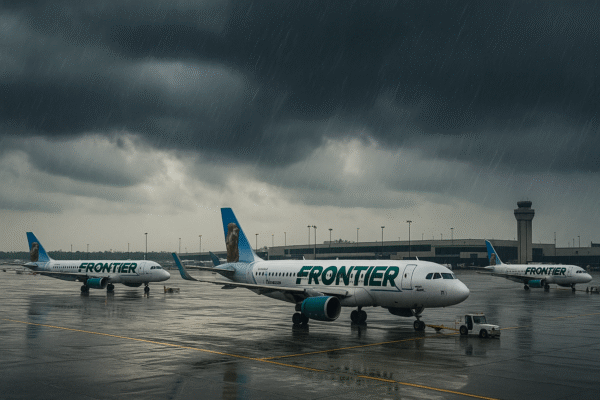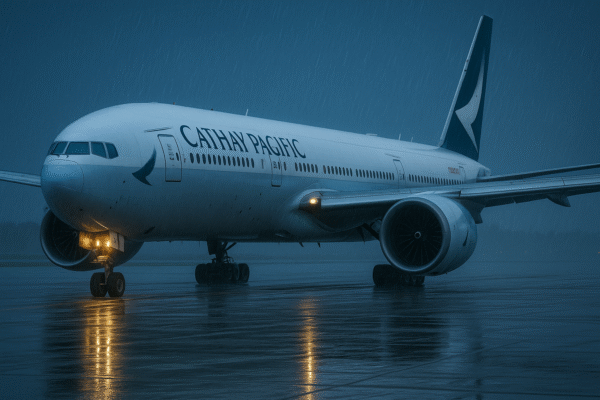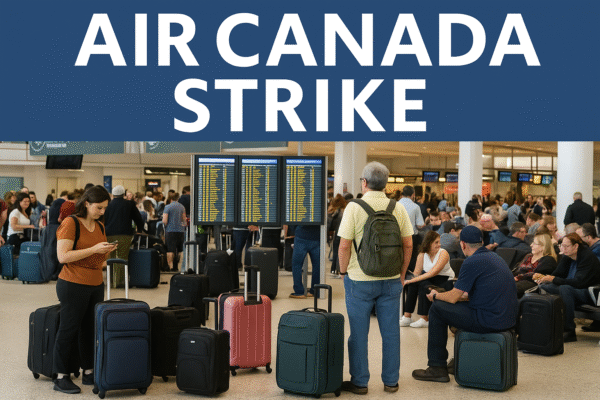On August 16, 2025, Air Canada announced a complete suspension of its flights after the Canadian Union of Public Employees (CUPE) called for an immediate strike. The decision paralyzed the airline’s network at the height of the summer season, disrupting thousands of travelers across major Canadian airports, including Toronto Pearson, Montreal-Trudeau, Vancouver International, and Calgary International.
Despite the Canadian Industrial Relations Board (CIRB) ordering CUPE flight attendants back to work, the union refused, leaving the airline unable to resume operations. Air Canada initially planned to restart limited services on August 17 but later confirmed that all flights would remain grounded until August 18, 2025, when operations are scheduled to gradually return.
Impact on Summer Travel Plans
The timing could not have been worse. Air Canada, which normally operates over 700 flights daily, was forced to cancel around 240 flights in just two days. Families heading for summer vacations, international tourists arriving in Canada, and business travelers attending conferences all faced last-minute chaos.
Travel experts estimate that tens of thousands of passengers have been affected, with ripple effects spreading to connecting flights across North America, Europe, and Asia. Popular tourist routes to destinations like New York, Paris, London, and Cancun were among those most severely impacted.
At Toronto Pearson International Airport, stranded travelers were seen queuing at information desks and attempting to rebook flights with alternative carriers. In Montreal and Vancouver, hotel demand surged as travelers scrambled to find overnight accommodation.
Refunds and Rebooking Options for Affected Passengers
To ease frustrations, Air Canada has confirmed that all passengers with canceled flights are eligible for full refunds or travel credits. Additionally, the airline is rebooking travelers on partner airlines, although limited availability during the peak travel season makes securing new seats challenging.
Options for passengers include:
- Full Refunds: Passengers can request a refund directly from Air Canada, with expedited processing promised.
- Travel Credits: Customers can choose flexible credits to be used for future flights.
- Rebooking on Other Airlines: Limited availability is being offered, especially for international flights.
Travelers are strongly advised to check their emails and Air Canada’s official website before heading to the airport. The airline has also cautioned against arriving without confirmed rebooking, as wait times remain long and alternative flights are filling up rapidly.
Air Canada Flights Set to Resume on August 18
Air Canada has confirmed that flights will gradually resume on August 18, 2025, for both Air Canada and Air Canada Rouge. However, industry analysts warn that it could take several days before operations fully normalize due to backlogs.
Passengers flying in the next week should expect delays, last-minute changes, and potential rerouting. Travel advisors recommend arriving early at the airport, confirming flights before departure, and having contingency plans, especially for connecting international flights.
Tourism and Business Travel Disruptions
The strike has sent shockwaves through Canada’s tourism and business travel sectors. With August being one of the busiest months for inbound travel, major cities such as Toronto, Montreal, and Vancouver have seen hundreds of tourists stranded.
Hotels near airports reported spikes in bookings as stranded passengers sought last-minute accommodation. Local tourism boards in Quebec and British Columbia expressed concern that the strike may deter international visitors during a period when Canada relies heavily on summer tourism revenue.
For business travelers, the cancellations caused delays in international conferences, trade fairs, and corporate meetings. Several multinational firms operating in Canada issued statements acknowledging disruptions to employee travel.
Air Canada’s Response and Future Outlook
In a public statement, Air Canada reaffirmed its commitment to resuming operations safely and efficiently. The airline apologized to passengers and emphasized its focus on customer care during this crisis. While the labor dispute with CUPE remains unresolved, Air Canada has made it clear that passenger needs are the top priority.
Industry insiders believe that while the strike will damage Air Canada’s short-term reputation, the airline’s strong brand and essential role in Canadian aviation will allow it to recover quickly.
What Travelers Should Do Next
For those affected by the strike, travel experts recommend the following steps:
- Check Flight Status: Monitor Air Canada’s website and emails for updates.
- Request Refunds or Credits: Submit refund requests as soon as possible to avoid processing delays.
- Rebook Quickly: Seats on partner airlines are limited; secure alternatives early.
- Plan for Delays: Even after August 18, allow extra time for airport processing and possible schedule changes.
- Stay Informed: Follow updates from the Canadian government and Air Canada regarding labor negotiations and service updates.
Conclusion: A Stressful Summer for Air Canada Travelers
The Air Canada strike of August 2025 has created one of the most significant disruptions in recent aviation history, with hundreds of flights canceled and thousands of travelers stranded across Canada and beyond. While operations are set to resume on August 18, passengers should remain cautious and prepared for continued delays.
Despite the challenges, Air Canada’s quick response with refunds, credits, and rebooking options shows its determination to rebuild trust with passengers. For now, travelers heading through Canada’s busiest airports in Toronto, Montreal, Vancouver, and Calgary should stay informed and make flexible plans as the airline works toward restoring its full service.
For more travel news like this, keep reading Global Travel Wire















